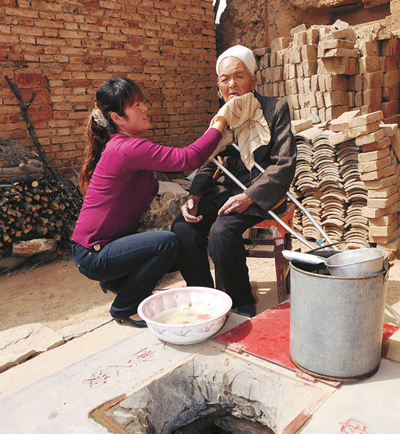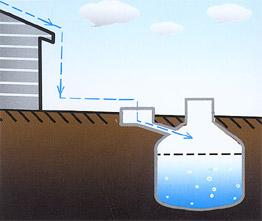|
||||||||||
| Home Nation World Business Opinion Lifestyle ChinAfrica Multimedia Columnists Documents Special Reports |
|
||||||||||
| Home Nation World Business Opinion Lifestyle ChinAfrica Multimedia Columnists Documents Special Reports |
| ChinAfrica |
| Dry No More |
| The nationwide charity Water Cellar for Mothers project helps families in arid regions access clean water |
| By Ni Yanshuo | VOL.10 March 2018 ·2018-03-01 |

Ma Yuening (left), a resident of Chaiyu Village in Weinan City, northwest China’s Shaanxi Province, and her family members get water from her water cellar
After her marriage 10 years ago, Zhang Shiluo, resident of Yingfeng Village, Liangshan Yi Autonomous Prefecture in southwest China's Sichuan Province, had the routine job of fetching water for her family. Every morning at the crack of dawn, she and other women set out from the village, more than 1,700 meters above sea level on the side of Xiaoliang Mountain, to make the arduous trek to the two water pools on the mountain's summit to get water for their families. The whole trip usually took two to three hours.
"It was my most important task. Without water, we could not survive the day. Actually, people in my village have done this for generations," said Zhang, now 32. Even though the unpurified water she got often caused health problems for her and her three children, she said it was still better than having no water at all.
Because of the unique geological environment and the high-altitude location, the soils there have low water storage capacity and many villages in the area suffered from the same problem. According to Zhang, villagers only washed their faces once a week in order to save water, let alone taking a bath. "Many men went out to work in big cities in order to earn money, leaving the work of carrying water to women and old people," she added.
But the situation changed in late 2016 when the Water Cellar for Mothers project was launched in her village. Now, she can get water without leaving her home. "I can wash my face every day and take a bath regularly," she said.
Funded by the project, a big water supply facility was built in her village, which includes a pipeline, ranging 13.8 km to three water resources on top of the mountain, and other facilities like water cellars, water purification pools and water storages. Now, all residents in the village can get access to tap water. In addition, villagers can also use the water to raise livestock and irrigate farmlands. Water Cellar for Mothers project is perfectly aligned to this year's UN World Water Day's theme of Nature for Water, which explores how nature can be used to overcome the water challenges of the 21st century, according to Qin Guoying, Secretary General of the China Women's Development Foundation (CWDF).
"It is a good way to utilize rainwater for people's use and overcome the challenges of water scarce areas with a nature-based solution," she said.
In addition to the meeting the daily water needs to sustain life, the project has other beneficial spin-offs. "Thanks to the Water Cellar for Mothers project, women in the village do not need to carry water from afar and they now have more time do value-added work," said Bai Xiuying, President of the Women's Federation of Leibo County. "Some grow tea and others make clothes and bags featuring Yi embroidery patterns, which they sell. They have many ways to increase their income now."
Bai noted that the village collects 10 yuan ($1.6) from each family a year and employs a professional to manage and maintain the facilities.
Making water available
Yingfeng is not the only village that has benefited from the project. It was jointly launched by the All-China Woman's Federation, Beijing Municipal People's Government and China Central Television in December 2000 and was put into practice by CWDF in February the following year. A charity project, it relies on public donations which are used to build small cement water cellars for families and central water supply facilities for villages and townships in arid areas in China.
Evidence shows that a water cellar of 36 cubic meters can collect 50-80 cubic meters of rainwater annually, which is sufficient for the daily use of a family of three to five members for a year. With two such cellars, a family can even have water to irrigate crops, thus ensuring sustainable development. Experts believe that building water cellars is the most convenient, economical and practical way of effectively utilizing rain water in dry areas.
By the end of 2016, the project had built 139,500 rainwater-collecting cellars and 1,739 central water supply facilities, with total investment of 910 million yuan ($144.4 million), helping more than 2.6 million people in 25 provinces, municipalities and autonomous regions to access clean water.
During the 17 years of development, the project has expanded its functions. In addition to its major focus of providing drinkable water to arid regions, it also helps impoverished families out of poverty by developing biogas, farming, animal breeding, health care and courtyard landscaping projects. Its focus has also expanded from alleviating water shortage to water supply for agricultural production and sustainable water utilization.
In 2011, Safe Water on Campus project, a sub-project of Water Cellar for Mothers, was launched to build and rehabilitate the safe water and sanitation facilities, install water purifying equipment and carry out education on health in schools. By the end of 2016, Safe Water on Campus project had invested more than 77 million yuan ($12 million) in 680 schools in 24 provinces, municipalities and autonomous regions, helping them build and upgrade safe water facilities, install water purification equipment and organize health education, directly benefiting more than 370,000 teachers and students.
International recognition
Water Cellar for Mothers project has garnered international recognition. Country Water Action, a report released by the Asian Development Bank, has a section introducing the project and commended it as a remarkable initiative securing safe water for people in arid regions.
Reports of international organizations such as the World Bank and the United Nations also reaffirmed the great role the project is playing in alleviating people's suffering.
In 2015, the U.S.-based Minor Planet Center officially named minor planet No.207715 as Muqin Shuijiao (Chinese for Water Cellar for Mothers), to highlight the great achievement the project had made in the past. According to Qin, Water Cellar for Mothers project will continue to develop in light of the United Nations 2030 Agenda for Sustainable Development and China's 13th Five-Year Plan (2016-20), and will be launched globally. "We hope to launch Water Cellar for Mothers project in less developed countries, such as those in Africa," she said.
Lu Youqing, who worked as Chinese ambassador to Tanzania in 2012-17, also thinks African countries can benefit from the project. He investigated the situation in Tanzania and believes that the project can work well there.
According to Lu, although the average annual rainfall of Tanzania in the past 10 years is as high as 1,071 mm and even the driest region Dodoma can receive 570 mm of rainfall a year on average, due to the shortage of water conservancy facilities, however, Tanzania is still faced with a severe water shortage which is hampering social and economic development and the improvement of people's livelihood.
"Water Cellar for Mothers project of China can be used as a good reference," said Lu. "It's expected that with the joint efforts of China and Tanzania, a suitable water conservancy and irrigation system could be established in Tanzania to benefit the local people."
Water Cellar for Mothers Donations

Based on China Women's Development Foundation (CWDF), Water Cellar for Mothers relies mainly on public donations, including those from individuals and businesses. People can easily donate online via the post office, the bank and at the CWDF office. An individual can donate a water cellar (including a filtration system) for a family which can be named after the donor. When a company donates to build water cellars for a village or a township, all the water cellars in the village or the township will also bear the company's name.
| About Us | Contact Us | Advertise with Us | Subscribe |
| Copyright Beijing Review All rights reserved 京ICP备08005356号-5 京公网安备110102005860号 |